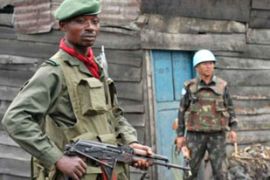Congo ‘risks return to war’
Failing disarmament efforts threaten national stability, rights group says.

Published On 25 Jan 2007
Since 1994, the DRC has been wracked by armed conflicts and human rights abuses. Between 1.4 million and 1.6 million people have been displaced by two civil wars and part of the country remains in the control of “warlords”.
The DRC’s uncontrolled armed groups are clustered around the east of the country, where most of the DRC’s considerable mineral wealth is, including its gold mines.
An agreement to unite the fractious country was reached in June 2003, bringing some measure of peace and establishing an interim government under Joseph Kabila as president.
Government undermined
Kabila’s administration has the job of reforming the army, encouraging fighters from numerous armed groups to hand in their weapons and either join the national armed forces or reintegrate into society.
But the report said goverment efforts have been undermined by political, military, ethnic and economic rivalries inherited from the war.
|
“Even prisoners serving prison sentences for crimes under international humanitarian law have been integrated into the new army” Amnesty International |
Tawanda Hondora, deputy director of Amnesty International’s Africa programme, said: “A failed demobilisation and army reform programme risks a new cycle of political and military crises.”
He said that failure of the programme would have “potentially disastrous consequences for hundreds of thousands of people”.
Disarmament is mandatory for child soldiers and those who are physically unfit.
Those judged to be “morally unsuited” are also to be demobilised. But Amnesty International says there are no known cases of fighters being forcibly decommissioned on moral grounds, raising concerns the army will be populated with human rights abusers.
The report says that “… even prisoners serving prison sentences for crimes under international humanitarian law have been integrated into the new army”.
This month, more than 250 integrated army soldiers were reported to have rampaged through the town of Bunia, raping women and looting shops.
Disarmers shot
Those in command of armed groups have also proved unwilling to have their private armed forces disbanded.
The report details several cases of soldiers being killed by their commanders and colleagues when they chose to disarm.
In a case of army infighting, soldiers interviewed in the report say that a company commander, named in the report as Uruber, was killed after he reported to an army intelligence officer at Kudikoka.
The officer reportedly gouged out Uruber’s eyes before instructing him to flee and then shooting him in the back.
Marginal success
The scheme has, however, had some measure of success.
The voluntary disarmament phase of the programme was officially completed in June 2005, with 15,911 fighters, including 4,525 child soldiers, arriving at reception centres.
Only 780 applied to be integrated into the army.
 |
| Some fighters worry that, away from home, they will become targets [EPA] |
But there have been delays to the reform programmes and some former private soldiers have become “deeply disenchanted with the lack of reintegration opportunities”.
Protests have been organised by disarmed soldiers in towns where the decommissioning centres are located.
Some former fighters have said they were “tricked” and are demanding their weapons be returned.
The report also says that the $200m set aside for the programme, with half provided by the World Bank and half provided by “the donor community” including the EU, has now been used up.
Sectional conflict
Communities have become concerned by the loss of their local protectors, while the fighters themselves worry that, away from their homes, they will become targets.
The report says: “Armed groups who chose reintegration into the new army are afraid of being sent … to regions where they will not be accepted by the local population.”
Despite winning elections last year, Kabila, the country’s first democratically elected president in more than 20 years, still faces factional conflict.
After the elections in October, fighters loyal to Jean-Pierre Bemba, an opposition presidential candidate, clashed with Kabila’s supporters outside the country’s supreme court.
Asked about the reform programme in an interview with Al Jazeera, Kabila said: “We are restructuring the defence force and the military police… and will continue until 2008.
“I’ve got to restore peace in Congo.”
Amnesty’s report says success of the army reform programme is a “precondition” for peace.
Source: Al Jazeera